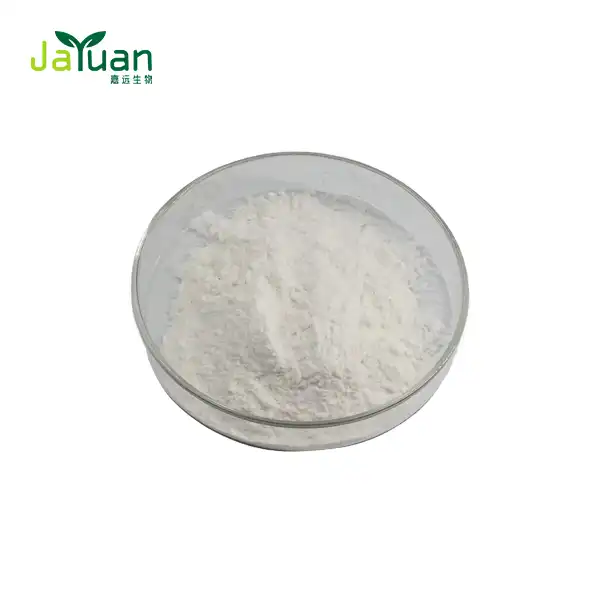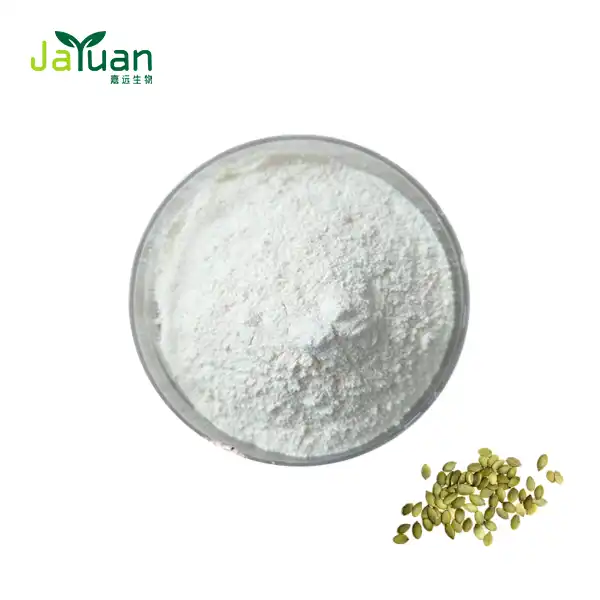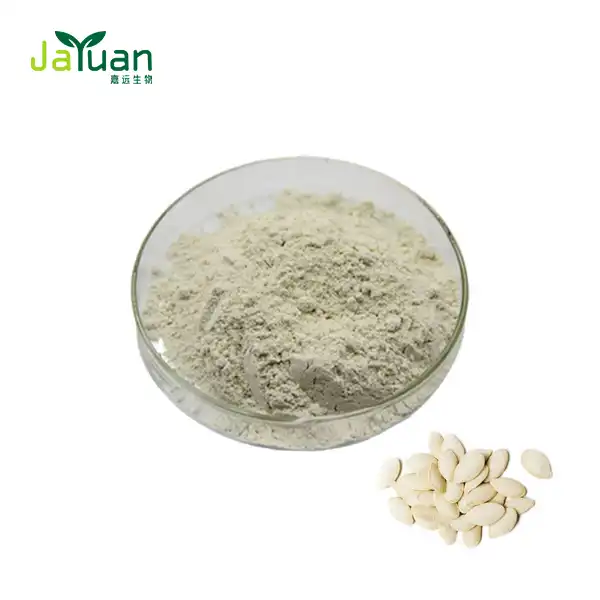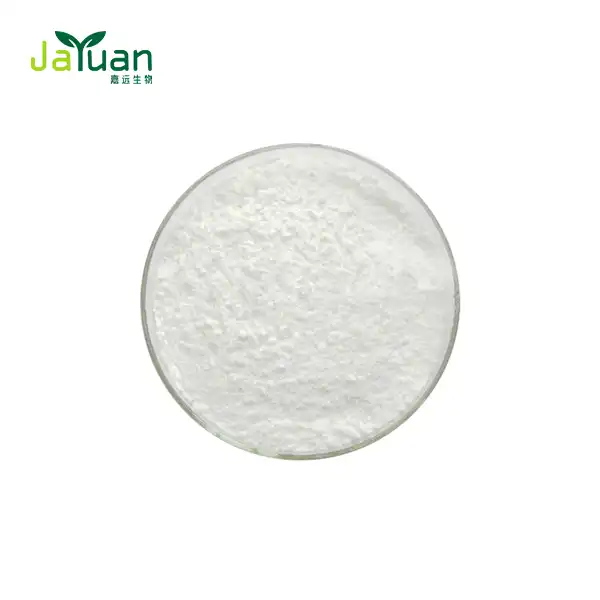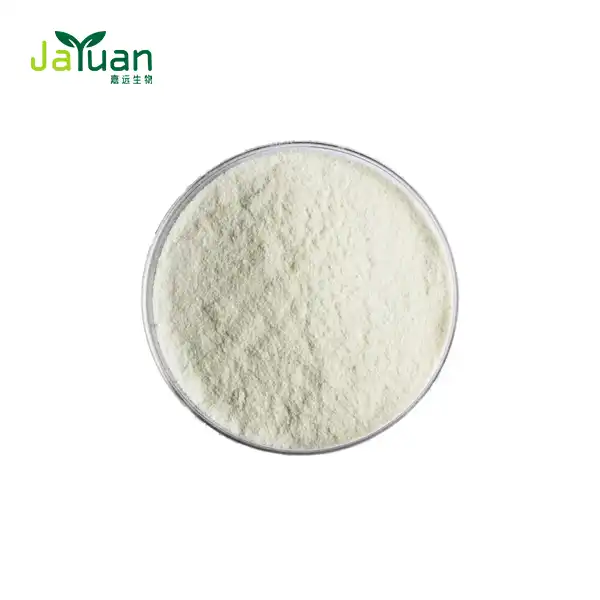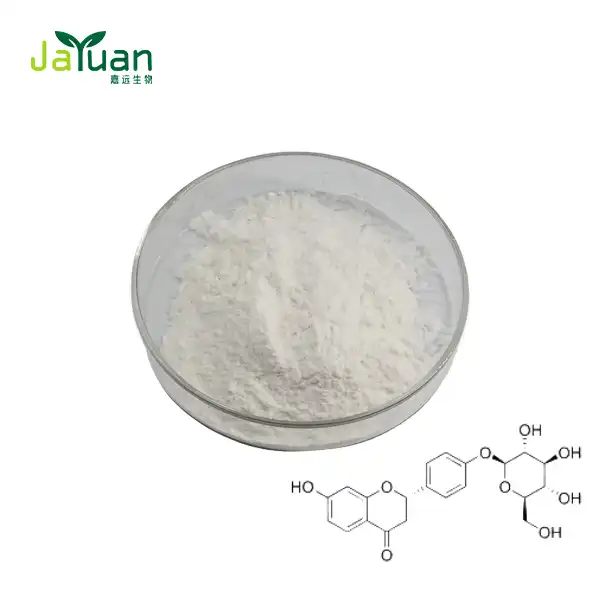What is the scientific evidence supporting cytisine's use for addiction?
Addiction is a complex issue that affects millions of people worldwide. As researchers and healthcare professionals continue to search for effective solutions, one compound has been gaining attention for its potential in addressing addiction: cytisine. This naturally occurring alkaloid, found in plants of the Fabaceae family, has shown promising results in scientific studies. In this article, we'll explore the scientific evidence supporting cytisine supplement's use for addiction and why it's becoming an increasingly popular option for those seeking to overcome dependence on various substances.

Product Name: Cytisine
CAS NO.: 485-35-8
Molecular formula: C11H14N20
Molecular weight: 190.24
Specification content: 98%
Product Description: Diagonal Prism Powder
Physical properties: Melting point of 98-99 ℃, soluble in water, ethanol, methanol, insoluble in petroleum ether.
Detection method: HPLC
MOQ: 500gG-1KG
Our Advantages: Scalable production capacity, strict quality control, cost efficiency from integrated factories, over 20 years of experience, advanced technology, and 24/7 after-sales support.
Certificaions: FSSC2000/ISO2000/HALAL/KOSHER/HACCP
Delivery terms: FedEx, DHL, EMS, UPS, TNT, all kinds of the airline, international shipping companies.
Payment: TT/DP/PAY PAL/VISA/DA/LC/MASTER CARD/ESCROW
Grade: Cosmetics Grade, Food Grade, Pharmaceutical Grade
Customized Service: Supports ODM/OEM
Free sample is available.
We do not sell retail quantities to individuals.
Key Clinical Trials on Cytisine Efficacy
To understand the potential of cytisine in addressing addiction, it's crucial to examine the key clinical trials that have been conducted. These studies provide valuable insights into the efficacy of cytisine supplements and their potential impact on addiction management.
Smoking Cessation Studies
One of the most extensively researched areas for cytisine use is in smoking cessation. Several clinical trials have demonstrated the compound's effectiveness in helping individuals quit smoking:
- A 2011 study published in the New England Journal of Medicine involved 740 smokers. The results showed that participants using cytisine were three times more likely to quit smoking compared to those using a placebo.
- A 2014 study in the New Zealand Medical Journal compared cytisine to nicotine replacement therapy. The study found that cytisine was more effective in helping smokers quit, with a 22% success rate compared to 15% for nicotine replacement therapy.
- A 2018 systematic review and meta-analysis published in Addiction examined 8 randomized controlled trials involving over 4,000 participants. The review concluded that cytisine was more effective than placebo and potentially more effective than nicotine replacement therapy for smoking cessation.
Alcohol Dependence Research
While not as extensively studied as its effects on smoking cessation, cytisine has also shown promise in addressing alcohol dependence:
- A 2016 preclinical study published in the European Journal of Pharmacology found that cytisine reduced alcohol consumption and preference in mice, suggesting potential applications for alcohol addiction in humans.
- A 2019 study in the journal Neuropharmacology demonstrated that cytisine reduced alcohol self-administration and seeking behavior in rats, further supporting its potential use in alcohol addiction treatment.
Cytisine's Mechanism of Action Explained
To fully appreciate the scientific evidence supporting cytisine's use for addiction, it's essential to understand how this compound works within the body. Cytisine's mechanism of action is primarily related to its interaction with nicotinic acetylcholine receptors (nAChRs) in the brain.
Interaction with Nicotinic Acetylcholine Receptors
Cytisine acts as a partial agonist of nAChRs, particularly the α4β2 subtype. This means it binds to these receptors and partially activates them, but not to the same extent as nicotine or other addictive substances. This partial activation has several important effects:
- Reduced cravings: By partially activating nAChRs, cytisine can help alleviate the intense cravings associated with addiction.
- Decreased reward response: Cytisine's partial activation of nAChRs can reduce the pleasurable effects of addictive substances, making them less rewarding and potentially less addictive.
- Withdrawal symptom relief: The compound's interaction with nAChRs can help mitigate withdrawal symptoms, making it easier for individuals to abstain from addictive substances.
Neuroplasticity and Addiction
Recent research has also suggested that cytisine supplement may play a role in promoting neuroplasticity, which is the brain's ability to form new neural connections and adapt to changes. This aspect of cytisine's action could be particularly beneficial in addiction recovery:
- A 2020 study published in the journal Molecular Psychiatry found that cytisine promoted the growth of new neurons in the hippocampus, a brain region associated with learning and memory.
- This neuroplastic effect could potentially help individuals overcome addiction by facilitating the formation of new, healthy neural pathways and behaviors.
Comparing Cytisine Studies to Other Cessation Aids
To fully appreciate the scientific evidence supporting cytisine's use for addiction, it's valuable to compare studies on cytisine with those of other cessation aids. This comparison can provide context for cytisine's efficacy and potential advantages.
Cytisine vs. Varenicline
Varenicline is a widely prescribed smoking cessation medication that, like cytisine, acts as a partial agonist of nAChRs. Comparing studies on these two compounds reveals interesting insights:
- A 2014 systematic review published in Thorax compared the efficacy of cytisine and varenicline. The review found that both compounds were more effective than placebo for smoking cessation, with similar quit rates.
- However, cytisine showed a potential advantage in terms of cost-effectiveness. As a natural compound, cytisine supplements are generally less expensive to produce than synthetic varenicline.
- A 2021 study in the New England Journal of Medicine directly compared cytisine to varenicline for smoking cessation. The study found that cytisine was non-inferior to varenicline in terms of efficacy, with similar quit rates and side effect profiles.
Cytisine vs. Nicotine Replacement Therapy (NRT)
Nicotine replacement therapy, which includes products like nicotine gum and patches, is a common approach to smoking cessation. Comparing cytisine studies to NRT research provides additional context:
- The previously mentioned 2014 New Zealand study found that cytisine was more effective than NRT for smoking cessation, with higher quit rates at both 1 month and 6 months.
- A 2019 Cochrane review of smoking cessation therapies found that both cytisine and NRT were effective compared to placebo, but suggested that cytisine might be more effective than NRT based on indirect comparisons.
- Cytisine's potential advantages over NRT include its lower cost, shorter treatment duration, and the fact that it doesn't contain nicotine, which may be preferable for some individuals seeking to overcome nicotine addiction.
Potential for Broader Addiction Applications
While most studies on cytisine have focused on smoking cessation, the compound's mechanism of action suggests potential applications for other forms of addiction:
- The preclinical studies on alcohol dependence mentioned earlier indicate that cytisine may have broader applications in addiction treatment.
- Some researchers have suggested that cytisine's action on nAChRs could potentially be beneficial for other substance use disorders, such as opioid addiction, though more research is needed in this area.
- The potential neuroplasticity-promoting effects of cytisine could make it a valuable tool in addressing various forms of addiction by facilitating behavioral changes and the formation of new, healthier habits.
As research on cytisine supplements continues, we may see an expansion of its applications in addiction treatment beyond smoking cessation.
Conclusion
The scientific evidence supporting cytisine's use for addiction, particularly smoking cessation, is substantial and growing. Choosing a trustworthy cytisine supplier ensures consistent quality for research and personal use. Multiple clinical trials have demonstrated its efficacy in helping individuals quit smoking, with results comparable or superior to existing cessation aids. Its mechanism of action, involving partial activation of nicotinic acetylcholine receptors, provides a solid theoretical basis for its effects on addiction.
At Jiayuan Bio-Tech, we pride ourselves on our advanced extraction and purification processes, ensuring the highest quality cytisine products. Our state-of-the-art facilities and experienced team allow us to offer customized solutions to meet your specific requirements.
If you're interested in learning more about cytisine supplements and their potential applications, we encourage you to reach out to us. As a leading cytisine supplier, we're committed to providing high-quality products and supporting ongoing research in this exciting field. Contact us at sales@jayuanbio.com or sales1@jayuanbio.com for more information or to discuss your specific needs.
FAQ
1. Is cytisine safe for long-term use?
While most studies have focused on short-term use for smoking cessation, the long-term safety profile of cytisine is still being researched. Current evidence suggests it is generally well-tolerated, but as with any supplement, it's important to consult with a healthcare professional before long-term use.
2. Can cytisine be used alongside other cessation aids?
The combination of cytisine with other cessation aids hasn't been extensively studied. It's crucial to consult with a healthcare provider before combining cytisine with other treatments to ensure safety and efficacy.
3. Are there any known side effects of cytisine?
Common side effects reported in studies include nausea, vomiting, and sleep disturbances. However, these are generally mild and temporary. As with any supplement, individual responses may vary, and it's important to discuss potential side effects with a healthcare professional.
References
1. West R, Zatonski W, Cedzynska M, et al. Placebo-controlled trial of cytisine for smoking cessation. N Engl J Med. 2011;365(13):1193-1200.
2. Walker N, Howe C, Glover M, et al. Cytisine versus nicotine for smoking cessation. N Engl J Med. 2014;371(25):2353-2362.
3. Hajek P, McRobbie H, Myers K. Efficacy of cytisine in helping smokers quit: systematic review and meta-analysis. Thorax. 2013;68(11):1037-1042.
4. Tutka P, Zatonski W. Cytisine for the treatment of nicotine addiction: from a molecule to therapeutic efficacy. Pharmacol Rep. 2006;58(6):777-798.
5. Cahill K, Lindson-Hawley N, Thomas KH, Fanshawe TR, Lancaster T. Nicotine receptor partial agonists for smoking cessation. Cochrane Database Syst Rev. 2016;(5):CD006103.
6. Coe JW, Brooks PR, Vetelino MG, et al. Varenicline: an alpha4beta2 nicotinic receptor partial agonist for smoking cessation. J Med Chem. 2005;48(10):3474-3477.

